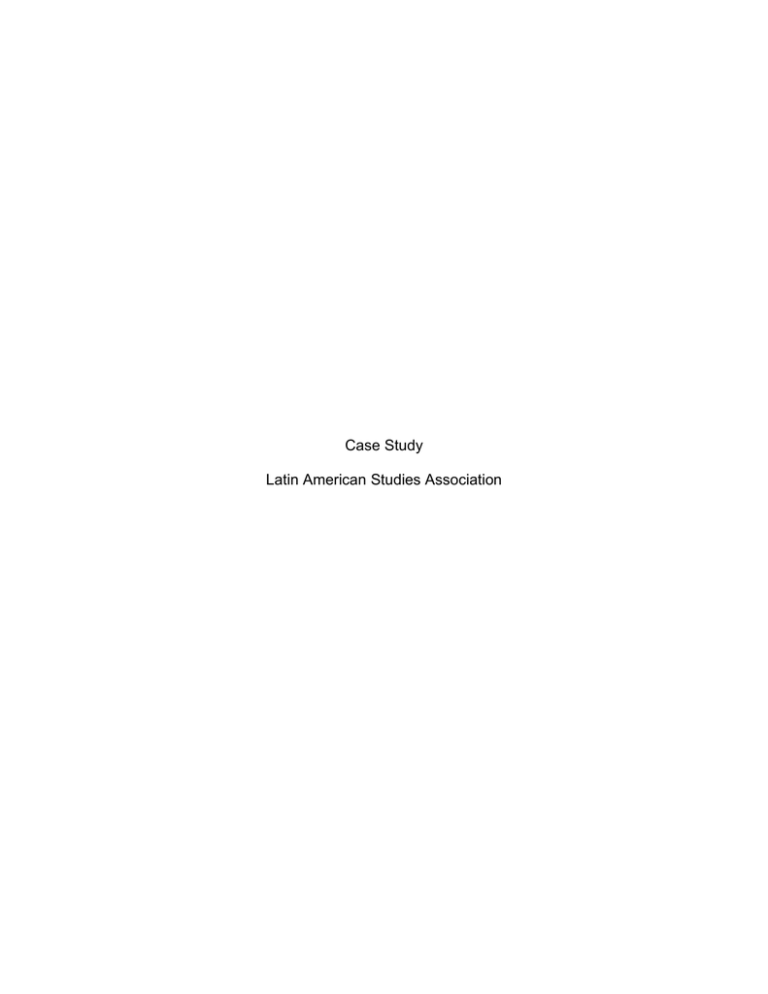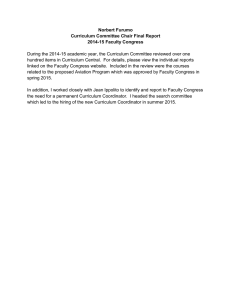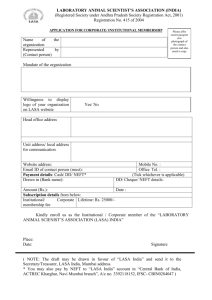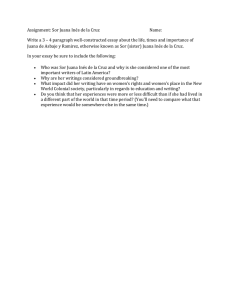Case Study Latin American Studies Association
advertisement

Case Study Latin American Studies Association Background: The Latin American Student Organization (LASA) is the largest professional association in the world for individuals and institutions engaged in the study of Latin America. With over 5,000 members, twenty-five percent of whom reside outside the United States, LASA is the one association that brings together experts on Latin America from all disciplines and diverse occupational endeavors, across the globe. LASA's mission is to foster intellectual discussion, research, and teaching on Latin America, the Caribbean, and its people throughout the Americas; promote the interests of its diverse membership; and encourage civic engagement through network building and public debate. Every eighteen months specialists on Latin America gather at the LASA International Congress. Featuring over 900 sessions, including plenary sessions and informal meetings, the Congress is the world's premier forum for expert discussion on Latin America and the Caribbean. Membership is available to individuals and institutions sharing the Association's commitment to the field of Latin American studies. The Association also works to advances the Latin Americani community in numerous other ways. It provides access to the Latin American Research Review, the premier U.S.-based journal in Latin American studies; it publishes the LASA Forum, a quarterly newsletter; it alerts members to professional opportunities; it recognizes scholarly achievement and it represents Latin Americanist’s interests and views before the U.S. government and at times to governments elsewhere. The LASA secretariat is located in Pittsburgh and is partially funded by the University of Pittsburgh. The executive director and her staff of five are responsible for the day to day LASA operations and, in particular, the organization of the International LASA Conference that attracts more than 5,000 participants. Congress Coordinator Position Job Description The LASA Congress Coordinator will assist the Executive Director in coordinating all aspects of the LASA Congress held every eighteen months which may include: overseeing the implementation and flow of conference projects both internally and externally; contributing to concept development, financial reports and budget monitoring; drafting planning documents, reports and correspondence; managing and handling logistical arrangements for conferences; and database maintenance including data entry and management of the on-site Congress operations. This person will also assist in hiring, training, supervising, and managing Congress’ staff. Case Description In 2003, the Congress Coordinator position was created as a permanent position at LASA to coordinate all congress related activities. In the past, this position was temporary, for 15 months, and was located in the city wherever the Program Chair(s) were located. The first Congress Coordinator hired by LASA at the University of Pittsburgh was selected because of the following reasons: She was familiar with the organization. She had worked temporarily at LASA during peak times doing data entry, filing, and other required administrative tasks. She had participated in previous conferences as support staff. Her background and work experience matched the job description. The Congress coordinator began working for LASA in October, 2003 (one year before the conference). After three weeks of work, the Congress Coordinator requested a flexible schedule. Instead of 9 a.m. to 5 p.m., she preferred to work from 8 a.m. to 5:30 p.m. and not to work on Fridays. The Executive Director approved this new schedule. After two months, the Congress Coordinator refused to do any data entry arguing that she was afraid of making mistakes; she needed an assistant to do it. At the same time, the Congress Coordinator was requesting one and/or both of the administrative assistants to do data entry, mailing, and other tasks for her. The Congress Coordinator was on the phone most of the time, arguing that she was solving Congress problems. The administrative assistants started to complain because of the extra work they had to do for her. The Executive Director did not know any of this until one of the administrative assistants informed her of the situation. ______________________________________________________________________________ MEMO TO: HR Director From: Executive Director, Latin American Student Organization RE: Extension of provisional period: LASA Congress Coordinator According to our previous conversation, I would like to request a 6 months extension of the provisional period for J, LASA Congress Coordinator. The reasons for this request are: It is not clear that the incumbent has understood the scope of the work expected from her. This may be just a misunderstanding or the need of a longer learning curve than expected. I have clarified to her the need to do a variety of work in her area of responsibility (i.e. use of congress database, data entry at peak times, handling of mailing, etc.) and have stressed the importance of this. I need the extra provisional time to see that the candidate improves her behavior in this area. LASA will be paying for a database course to improve her technical skills. The candidate is not totally clear about her level of authority and there have been some unpleasant situations due to this. I have had some recent conversations with her explaining what she is allowed to do and what she is not. I would need the extra provisional time to see that she has clearly understood this and she acts according to the stated parameters. __________________________________________________________________ Case Analysis LASA’s environment is based upon a foundation of communication and feedback. However, in this current case, the program is having difficulty in these areas. It seems that no formal processes were established for employees who had a complaint or problem; this prove difficult when employees wanted to communicate theses problems to their supervisor. When Juana began asking other administrative assistants to perform her job functions, they did it, as to not disrupt the work environment, but soon the requests to”help” Juana with her work became increased. The administrative assistants waiting until the problem had escalated before they reported it to the Executive Director. This shows that problems need to escalate before employees feel comfortbleenough to speak up. This is an example of the lack of upward communication in this office. This could be an issue of the work environment, but most importantly it is an issue of lack of communication. The Executive Director or Juana’s supervisor should be the one responsible to ensure that the lines of communication are always open. It is their responsibility to make the option of approaching a superior with a problem or question regarding anyone’s role in the office very clear. The administrative associates should have been told what the new Congress Coordinator’s role and expectations would. Also, they should have also been told if their job requirements would change by the hiring of a full time LASA Congress Coordinator. Having a new person come into an office especially in a newly created position, is difficult; the new employee and current staff must adjust the culture of the environment. There seems to be a strong dominate culture in this office. It takes tim before a new employee can adapt to the situation and change is not readily accepted by the staff. Juana in particular was having difficulty in her new role adapting to the office culture. She had been a member of this office before, but now she was there in a new context and was having difficulty with the culture and her new expectations. Expectations for the new Congress Coordinator were set in the job description that Juana was hired to fill. She should have also been very familiar with the requirements having worked as a temporary employee in this arena in the past. Juana should have understood what was expected of her, but did she really know how to achieve these expectations? Juana had always been a member of the support staff for the conference, not the coordinator. Did she fully understand what was required of the role and how tasks were completed to get the end result of a successful conference? Having tasks written down in a job description does not necessarily mean the person knows how to be successful in completing the tasks at hand. More importantly, it appears that the Executive Director has not clearly stated the expectations of performance that is required of the Congress Coordinator position. Without knowing what was expected, Juana was, in essence, free to set her own aspirations. Expectations influence our behavior. When people know what is expected of them, they are more apt to perform in the manner that is expected of them. Since Juana had only performed limited administrative functions in the past, she was not clear on what was expected of her. This was clearly a performance problem. Had she been advised up-front of her actual duties, some of the problems that arose could have been avoided. The Executive Director should have gone over the position’s duties with her. If there were any areas of concern, they should have been addressed with courses of action planned. The Executive Director should not have taken it for granted that expectations were established and that Juana had a clear understanding of them. Juana performed data entry before; why was it a problem now? These expectations should have been set forth as non-negotiable- since they are required to complete the job. A conference with a large number of attendees and the reputation of the LASA was a stake. Although, from Juana’s point of view, she probably felt that these tasks were one that the administrative assistants should perform as she did in the past on a temporary basis. Juana was very familiar with the clerical part of her job (such as data entry, database queries), so this part should have actually been one of her easier tasks to follow through. Not being able to completed familiar tasks should have been a red flag to the Executive Director of proceeding job performance problems. The Congress Coordinator may have felt by giving these clerical tasks to others she would be more able to focus on projects and reports. The Executive Director was lax in establishing specific performance expectations and in providing good management support to help Juana make the transition from temporary administrative assistant to Congress Coordinator. Juana needed help in setting goals and laying out the best objectives to achieve those goals. Goals that are more specific get better results. She needed guidance, she has been the support before and now in her new position she may have felt that other things were more important than the clerical work that was part of the position. The Executive Director should not have assumed that because the person hired had experience with the organization as a temp, it was expected she would quickly learn what the Congress Coordinator needed to do, from a coordination point of view, with some general guidelines from the secretaries (as previous congress coordinators had learned the job anyway). Juana also needed accountability for her work. In setting goals she would be able to directly see if she was making her target; and if not why? She would be accountable for any work not completed and learn to prioritize her work. The Executive Director needed to sit down with Juana and communicate her expectations clearly. She needed to express these expectations both verbally and in writing. The Executive Director was responsible for capturing all of the tasks of Juana’s position description into one document, sighting both a timetable and constraints in meeting these goals. The Executive Director also needed to follow up with Juana’s performance in intervals of one month, three months and at six months to find out if there was any problems or concerns; and keeping track of successes. The LASA coordinator only worked 4 days when it seems like the positions entailed a lot of communication and delivery with different vendors, registrants. If Juana requires flexibility in the workplace, then the Executive Director needs to keep track of these accommodations and share them with the rest of the staff to see that they adopt them as well. Grounds for legitimate reasons of job flexibility need to be implemented. It is important in such a small office like this one that coworkers mutually support one another. The Congress Coordinator and Administrative Assistants need to focus on the common goal of the LASA and work together. This relates perfectly to the article, “Flexibility versus Fairness?”1. The Congress Coordinator was being rewarded when she had not yet proven her capabilities. Perhaps there was no problem with this arrangement, but there has to be some resentment in the office when other members of the staff are required to come every day. This idiosyncrasy may lead to a hostile work environment; especially coupled with the fact Juana is requesting that the administrative associates assist her with her work. The administrators may begin to lack motivation, seeing their work as not as valuable or having more to do without being compensated. Effective work means strong relationships need to be built and respect cultivated among all workers in the office. An Executive Director wants to do everything possible to create a results-oriented environment that cultivates learning and teams; rather than each individual out for themselves. While it is clear the Executive Director has spoken to Juana about her performance; the memo to Human Resources does not explicitly indicate how the Juana’s performance problem will be solved. The Executive Director herself needs to come up with a strategy on how she will demand better results from Juana. She may want to implement a policy for the entire office staff; focusing on vital goals that the office can work towards achieving together and the rewards for achieving these goals. If monetary rewards are not permitted, other incentives could include a lunch at a nice restaurant, gift cards to coffee shops—anything to let the workers know you appreciate their hard work and dedication.






